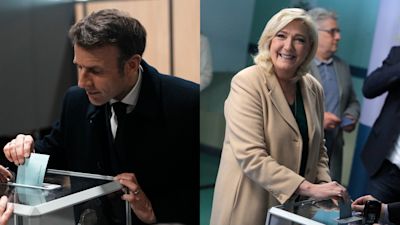Emmanuel Macron and far-right rival Marine Le Pen to face each other in presidential runoff

ITV News Europe Editor James Mates reports on the significance of the latest polling projections in France’s presidential election- which could be the biggest fight in Emmanuel Macron's career
French polling projections show President Emmanuel Macron and far-right rival Marine Le Pen are leading in the first round of France’s presidential election
If borne out by official results, the two will advance to a presidential runoff on April 24 with strong echoes of their last face-off in the 2017 election.
The projections show Macron with a comfortable first-round lead Sunday of between 27%-to-29% support, ahead of Le Pen, who is expected to capture 23%-to-24% of the vote. But the second round is likely to be tight.
On Sunday, up to 48 million eligible voters chose one of 12 candidates.
ITV News Europe Editor James Mates explains the results so far and what that means for the next stages
President Macron, a political centrist, for months looked like a shoo-in to become France’s first president in 20 years to win a second term.
But that scenario blurred in the campaign’s closing stages. The pain of inflation and steep pump, food and energy prices subsequently roared back as dominant election themes.
These sorts of issues could drive many voters into the arms of far-right leader Marine Le Pen, President Macron’s political nemesis.
The French leader, now 44, trounced Ms Le Pen by a landslide to become France’s youngest president in 2017. The win for the former banker who, unlike Ms Le Pen, is a fervent proponent of European collaboration, was seen as a victory against populist, nationalist politics.
In courting voters, Macron has economic successes to point to: The French economy is rebounding faster than expected from the battering of Covid-19, with a 2021 growth rate of 7% - the highest since 1969. Unemployment is down to levels not seen since the 2008 financial crisis.
When Russia invaded Ukraine on February 24, sparking Europe’s worst security crisis since World War II, President Macron got a polling bump, with people rallying around the wartime leader.
But 53-year-old Marine Le Pen is a now a more polished, formidable and savvy political foe as she makes her third attempt to become France’s first female president. And she has campaigned particularly hard and for months on cost of living concerns, capitalising on the issue that pollsters say is foremost on voters’ minds. Ms Le Pen also pulled off two remarkable feats.
Despite her plans to sharply curtail immigration and dial back some rights for Muslims in France, she nevertheless appears to have convinced growing numbers of voters that she is no longer the dangerous, racist nationalist extremist that critics, including President Macron, accuse her of being.
For expert analysis on big news stories, listen to the ITV News What You Need To Know podcast
Although a Marine Le Pen victory still appears improbable, much of her foe's advantage has subsequently evaporated. Kept busy by the war in Ukraine, Macron may be paying a price for his somewhat subdued campaign, which made him look aloof to some voters. Aside from Ms Le Pen and President Macron, far-left firebrand Jean-Luc Melenchon is among the prominent figures vying to take the presidential Elysee.